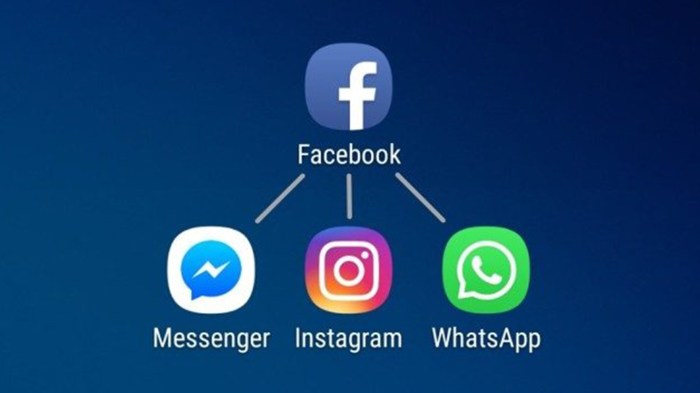WhatsApp and Facebook Messenger will soon talk to other messaging apps in Europe – WhatsApp and Facebook Messenger, two of the most popular messaging apps globally, are set to enable communication with other messaging apps in Europe. This move, driven by the European regulatory landscape and the Digital Markets Act (DMA), has significant implications for users, businesses, and the messaging industry as a whole.
The decision to enable cross-app messaging presents both opportunities and challenges. For users, it offers the convenience of seamless communication across different platforms, eliminating the need for multiple apps. For businesses, it opens up new channels for customer engagement and marketing.
Messaging Interoperability
The decision by WhatsApp and Facebook Messenger to enable communication with other messaging apps is a significant development that has the potential to reshape the way we communicate online. For users, this move offers the convenience of being able to stay connected with friends and family who use different messaging platforms, without having to switch between multiple apps.
It also has the potential to increase competition and innovation in the messaging space, as developers seek to create new and innovative features to attract users.
Benefits
- Increased convenience:Users can stay connected with friends and family who use different messaging platforms, without having to switch between multiple apps.
- Reduced costs:Interoperability can reduce costs for users who have to pay for SMS or MMS messages to communicate with people who use different messaging apps.
- Increased competition:Interoperability can increase competition in the messaging space, as developers seek to create new and innovative features to attract users.
Challenges
- Privacy concerns:Interoperability could raise privacy concerns, as users’ data may be shared between different messaging platforms.
- Security risks:Interoperability could increase security risks, as it could create new opportunities for hackers to attack messaging systems.
- Technical challenges:Implementing interoperability can be technically challenging, as different messaging platforms use different protocols and technologies.
European Regulatory Landscape
The European regulatory landscape has played a significant role in shaping the decision for WhatsApp and Facebook Messenger to enable interoperability with other messaging apps in Europe.
One of the key pieces of legislation that has influenced this decision is the Digital Markets Act (DMA). The DMA, which came into effect in November 2022, aims to promote fair competition and innovation in the digital market by regulating the behavior of large online platforms.
In the realm of instant messaging, WhatsApp and Facebook Messenger are poised to bridge the communication gap with other messaging platforms across Europe. This integration promises seamless interoperability, allowing users to connect with friends and family on different apps. For those transitioning to a new device, the process of transferring WhatsApp data is made simple with the comprehensive guide How to transfer WhatsApp to a new phone . With this integration, the boundaries of messaging apps blur, enabling Europe to embrace a more connected digital landscape.
Digital Markets Act (DMA)
The DMA includes a number of provisions that are relevant to the messaging industry. These provisions include:
- A requirement for large online platforms to provide interoperability with other platforms, upon request.
- A prohibition on large online platforms from engaging in anti-competitive practices, such as tying or bundling their services.
- A requirement for large online platforms to be transparent about their algorithms and data.
The DMA is expected to have a significant impact on the messaging industry. By requiring large online platforms to provide interoperability, the DMA will make it easier for users to switch between different messaging apps. This could lead to increased competition and innovation in the messaging market.
Technical Implementation

Enabling cross-app messaging presents several technical challenges. Interoperability requires the development of protocols, APIs, and standards that allow different messaging platforms to communicate seamlessly.
The adoption of open standards is crucial for ensuring interoperability. Standards define the technical specifications that messaging platforms must adhere to, enabling them to exchange messages in a consistent and reliable manner.
Protocols
- Protocols define the rules and procedures for exchanging data between devices and applications.
- Cross-app messaging requires the establishment of protocols that allow messaging platforms to connect, authenticate, and exchange messages securely.
APIs
- APIs (Application Programming Interfaces) provide a standardized way for applications to interact with each other.
- In the context of cross-app messaging, APIs allow messaging platforms to access the necessary functionality to send and receive messages from other platforms.
Standards
- Standards are formal agreements that define the technical requirements for interoperability.
- Standardization ensures that messaging platforms implement the same protocols and APIs, enabling seamless communication.
Market Impact

The interoperability of WhatsApp and Facebook Messenger with other messaging apps in Europe is set to reshape the competitive landscape of the messaging industry.
For existing messaging apps, this move could lead to increased competition and the need to innovate to maintain market share. New entrants, on the other hand, may find it easier to enter the market and compete with established players.
Impact on Existing Messaging Apps
- Increased competition: Interoperability will allow users to communicate with contacts on different messaging platforms, reducing the need to use multiple apps.
- Need for innovation: To retain users, existing messaging apps may need to invest in new features and functionalities that differentiate them from competitors.
- Potential for market share loss: If users find it convenient to use other messaging apps that offer interoperability, existing messaging apps could lose market share.
Impact on New Entrants, WhatsApp and Facebook Messenger will soon talk to other messaging apps in Europe
- Reduced barriers to entry: Interoperability makes it easier for new messaging apps to enter the market, as they can leverage the existing user base of other platforms.
- Increased visibility: New messaging apps can gain visibility and attract users by offering interoperability with popular platforms like WhatsApp and Facebook Messenger.
- Potential for niche market opportunities: New entrants can focus on specific niches or target markets that are not well-served by existing messaging apps.
Privacy and Security Considerations
As cross-app messaging becomes a reality, privacy and security concerns arise. Interoperability between messaging apps must address these concerns to ensure user trust and prevent misuse.
To safeguard user data, measures are being implemented, including:
Encryption
- End-to-end encryption ensures that messages remain private between the sender and recipient, even when passing through intermediary servers.
- This prevents unauthorized access to sensitive information, such as personal messages, financial data, or location details.
Data Protection
- Strict data protection regulations, such as the European General Data Protection Regulation (GDPR), govern the collection, storage, and processing of user data.
- Messaging providers must comply with these regulations to protect user privacy and prevent data breaches.
Abuse Prevention
- Measures to prevent abuse, such as spam, phishing, and harassment, are being implemented.
- These include spam filters, user reporting mechanisms, and cooperation with law enforcement agencies.
Final Conclusion
As WhatsApp and Facebook Messenger prepare to implement interoperability, the technical challenges of ensuring secure and reliable cross-app messaging must be addressed. The adoption of common protocols, APIs, and standards will be crucial in facilitating seamless communication. The impact on the competitive landscape of the messaging industry remains to be seen, but it is likely to create new opportunities for both existing players and new entrants.
FAQ Guide: WhatsApp And Facebook Messenger Will Soon Talk To Other Messaging Apps In Europe
What is the significance of WhatsApp and Facebook Messenger enabling communication with other messaging apps?
It allows users to communicate seamlessly across different messaging platforms, eliminating the need for multiple apps and enhancing convenience.
What are the potential benefits of this move for users?
Convenience, seamless communication across platforms, and access to a wider range of features and services.
What are the potential challenges for businesses?
Technical implementation, ensuring data security and privacy, and adapting to a more competitive landscape.
